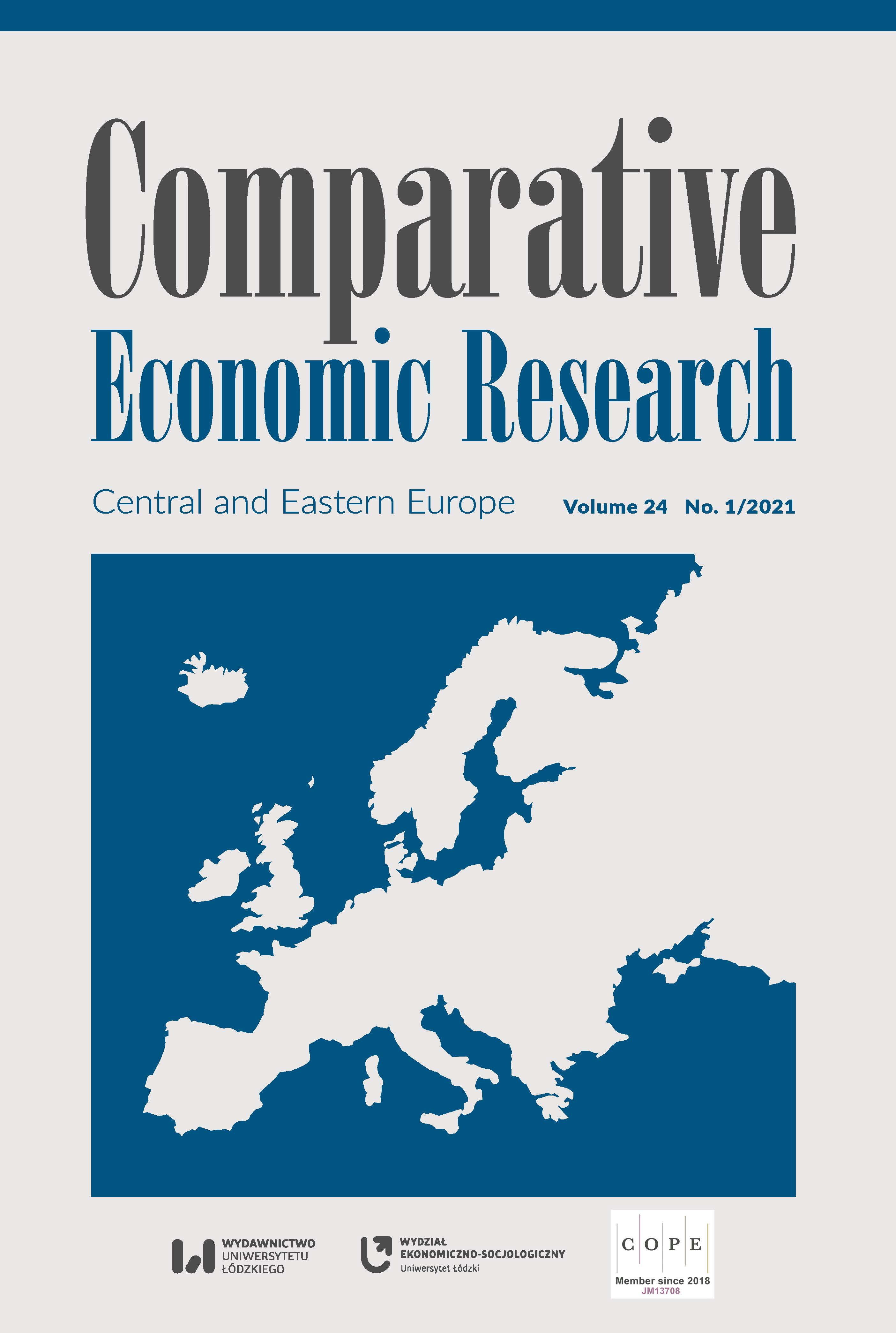Dependencies between Variables from the Area of the Monetary and Fiscal Policy in the European Union Countries
DOI:
https://doi.org/10.18778/1508-2008.24.01Keywords:
fiscal policy, monetary policy, coordination, European UnionAbstract
Research background: The core of coordinating a monetary and fiscal policy (policy mix) is based on combining both policies to achieve goals related to price stability, as well as economic growth and employment. In turn, the decisions of economic authorities in the monetary-fiscal game have a significant impact on economic variables in the economy. In the economic literature, the importance of monetary and fiscal policy coordination is emphasized as it has a positive effect on the stability of the economy. Purpose of the article: The aim of the article is to identify the dependencies between variables in the scope of fiscal policy and monetary policy under existing economic conditions and then assess their impact on the economy in the EU countries.
Methods: To achieve this objective, the following research methods were used: a review of the scientific literature, a presentation of statistical data, and statistical research methods.
Findings & Value added: The rationale for adopting such issues is to examine the impact of the financial crisis on the decisions of central banks and governments in the EU. The financial crisis has affected a change in the approach to conducting monetary and fiscal policy. The changing economic conditions forced economic authorities to take many decisions that affected the interaction between the central bank and the governments in the EU Member States. In many EU countries in the discussed period, there were significant interdependencies between variables in both monetary and fiscal policy.
Downloads
References
Aarle, B. van, Bovenberg, L., Raith, M. (1995), Monetary and fiscal policy interactions and debt stabilization, “Journal of Economics”, 62 (2), pp. 111–140, https://doi.org/10.1007/BF01226006
Google Scholar
DOI: https://doi.org/10.1007/BF01226006
Ahrend, R., Catte, P., Price, R. (2006), Interactions between monetary and fiscal policy: How monetary conditions affect fiscal consolidation, ECO/WKP 49, https://doi.org/10.2139/ssrn.1010655
Google Scholar
DOI: https://doi.org/10.2139/ssrn.1010655
Bennett, H., Loayza, N. (2001), Policy biases when the monetary and fiscal authorities have different objectives, Central Bank of Chile Working Papers, No. 66.
Google Scholar
Bhattacharya, J., Kudoh, N. (2002), Tight Money policies and inflation revisited, “Canadian Journal of Economics”, 35 (2), pp. 185–271, https://doi.org/10.1111/1540-5982.00127
Google Scholar
DOI: https://doi.org/10.1111/1540-5982.00127
Bhattacharya, J., Guzman, M., Smith, B.D. (1998), Some even more unpleasant monetarist arithmetic, “Canadian Journal of Economics”, 31 (3), pp. 596–623, https://doi.org/10.2307/136204
Google Scholar
DOI: https://doi.org/10.2307/136204
Buiter, W., Panigirtzoglou, N. (1999), Liquidity traps: how to avoid them and how to escape them, NBER Working Paper, 7245, https://doi.org/10.3386/w7245
Google Scholar
DOI: https://doi.org/10.3386/w7245
Cechetti, S. (2000), Making monetary policy: objectives and rules, “Oxford Review of Economic Policy”, 16 (4), pp. 43–59, https://doi.org/10.1093/oxrep/16.4.43
Google Scholar
DOI: https://doi.org/10.1093/oxrep/16.4.43
Cherif, R., Hasanov, F. (2012), Public debt dynamics: the effects of austerity, inflation, and growth shocks, IMF Working Papers, No. 12/230, https://doi.org/10.5089/9781475510553.001
Google Scholar
DOI: https://doi.org/10.5089/9781475510553.001
Chmielewski, T., Kapuściński, M., Kocięcki, A., Łyziak, T., Przystupa, J., Stanisławska, E., Wróbel, E. (2018), Monetary transmission mechanism in Poland. What do we know in 2017?, NBP Working Paper, No. 286.
Google Scholar
Clarida, R., Gali, J., Gertler, M. (2000), Monetary policy rules and macroeconomic stability: evidence and some theory, “Quarterly Journal of Economics”, 115 (1), pp. 147–180, https://doi.org/10.1162/003355300554692
Google Scholar
DOI: https://doi.org/10.1162/003355300554692
Corsetti, G., Higgins, M., Pesenti, P. (2016a), Policies and institutions for managing the aggregate macroeconomic stance of the eurozone, [in:] R. Baldwin, F. Giavazzi (eds.), How to Fix Europe’s Monetary Union. Views of Leading Economists, CEPR Press, London.
Google Scholar
Corsetti, G., Dedola, L., Jarociński, M., Maćkowiak, B., Schmidt, S. (2016b), Macroeconomic stabilization, monetary-fiscal interactions, and Europe’s monetary union, ECB Working Paper, Vol. 1988.
Google Scholar
DOI: https://doi.org/10.2139/ssrn.2910881
De Bonis, V., Della Posta, P. (2009), Strategic Interactions Among Central Bank and National Fiscal Authorities in a Monetary Union Subject to Asymmetric country Shocks, “Open Economy Review”, 20, pp. 241–263, https://doi.org/10.1007/s11079-007-9065-1
Google Scholar
DOI: https://doi.org/10.1007/s11079-007-9065-1
Dixit, A., Lambertini, L., (2003), Interactions of Commitment and Discretion in Monetary and Fiscal Policies, “American Economic Review”, 93 (5), pp. 1522–1542, https://doi.org/10.1257/000282803322655428
Google Scholar
DOI: https://doi.org/10.1257/000282803322655428
Eurostat Warehouse Database (n.d.), https://ec.europa.eu/eurostat/data/database (accessed: 5.12.2019).
Google Scholar
Havranek, T., Rusnák, M. (2013), Transmission lags of monetary policy: a meta-analysis, “International Journal of Central Banking”, 9 (4), https://doi.org/10.2139/Ssrn.2188438
Google Scholar
DOI: https://doi.org/10.2139/ssrn.2188438
Hein, E., Truger, A. (2014), Fiscal policy and rebalancing in the euro area: a critique of the German debt brake from a Post-Keynesian perspective, “Panoeconomicus”, 61 (1), pp. 21–38, https://doi.org/10.2298/PAN1401021H
Google Scholar
DOI: https://doi.org/10.2298/PAN1401021H
Hughes Hallett, A., Libich, J., Stehlik, P. (2014), Monetary and fiscal policy interaction with various degrees of commitment, “Czech Journal of Economics and Finance”, 64 (1), pp. 2–29.
Google Scholar
Nordhaus, W.D. (1994), Policy games: coordination and independence in monetary and fiscal policies, “Brookings Papers on Economic Activity”, 2, pp. 139–216, https://doi.org/10.2307/2534656
Google Scholar
DOI: https://doi.org/10.2307/2534656
OECD (2019), Short‑term interest rates (indicator), https://data.oecd.org/interest/short-term-interest-rates.htm (accessed: 5.12.2019).
Google Scholar
Samuelson, P., Nordhaus, W.D. (2010), Economics, The McGraw-Hill Companies, Boston.
Google Scholar
Stawska, J. (2017), The impact of policy mix instruments on the Euro Area economy in the low interest rates environment, “Ad‑Alta – Journal of Interdisciplinary Research”, 7, pp. 205–210.
Google Scholar
Stawska, J., Grzesiak, L. (2014), Challenges for policy mix in the context of the financial crisis – the case of Poland, “Journal of Finance and Financial Law”, 4, pp. 137–150.
Google Scholar
DOI: https://doi.org/10.18778/2391-6478.1.4.11
van Riet, A. (2010), Euro area fiscal policies and the crisis, “Occasional Paper Series ECB”, No. 109, pp. 7–34.
Google Scholar
DOI: https://doi.org/10.2139/ssrn.1325250
Von Hayek, F.A. (2006), The Constitution of Liberty, Routledge Classic, Milton Park, Abingdon.
Google Scholar
Woroniecka-Leciejewicz, I. (2015), Equilibrium strategies in a fiscal-monetary game. A simulation analysis, “Operations Research and Decisions”, 2, pp. 75–100.
Google Scholar
Downloads
Published
How to Cite
Issue
Section
License

This work is licensed under a Creative Commons Attribution-NonCommercial-NoDerivatives 4.0 International License.











